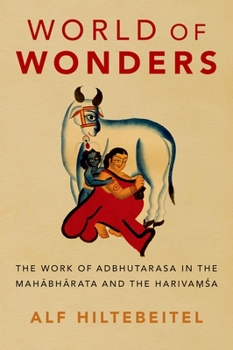World of Wonders: The Work of Adbhutarasa in the Mahabharata and the Harivamsa
In World of Wonders, Alf Hiltebeitel addresses the Mahabharata and its supplement, the Harivamsa, as a single literary composition. Looking at the work through the critical lens of the Indian aesthetic theory of rasa, "juice, essence, or taste," he argues that the dominant rasa of these two texts is adbhutarasa, the "mood of wonder." While the Mahabharata signposts whole units of the text as "wondrous" in its table of contents, the Harivamsa foregrounds a stepped-up term for wonder (ascarya) that drives home the point that Vishnu and Krishna are one. Two scholars of the 9th and 10th centuries, Anandavardhana and Abhinavagupta, identified the Mahabharata's dominant rasa as santarasa, the "mood of peace." This has traditionally been received as the only serious contestant for a rasic interpretation of the epic. Hiltebeitel disputes both the positive claim that the santarasa interpretation is correct and the negative claim that adbhutarasa is a frivolous rasa that cannot sustain a major work. The heart of his argument is that the Mahabharata and Harivamsa both deploy the terms for "wonder" and "surprise" (vismaya) in significant numbers that extend into every facet of these heterogeneous texts, showing how adbhutarasa is at work in the rich and contrasting textual strategies which are integral to the structure of the two texts.
Format:Hardcover
Language:English
ISBN:0197538223
ISBN13:9780197538227
Release Date:January 2021
Publisher:Oxford University Press
Length:368 Pages
Weight:1.44 lbs.
Dimensions:1.2" x 6.4" x 9.3"
Customer Reviews
0 rating





